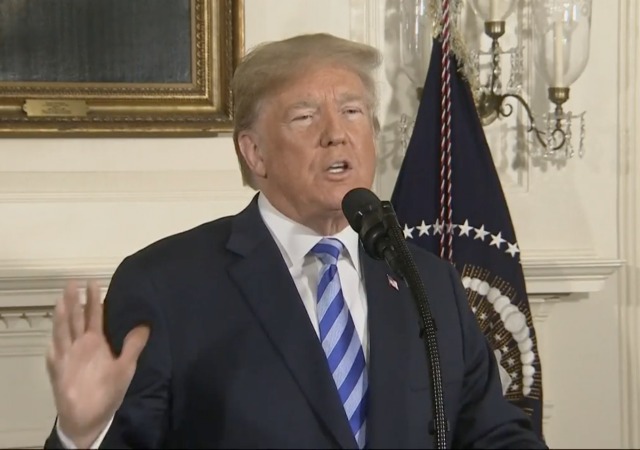Trump Will Sign First Step Act to Reform Criminal Justice
A bipartisan victory.

President Donald Trump will sign the First Step Act this morning at 11AM ET. It’s a huge win for criminal justice reform that has enormous bipartisan support.
The Senate passed the bill 87-12 and it breezed through the House, 358-36.
AEI summarized the bill:
The revised legislation does just that. The bill maintains House-passed provisions that improve federal prison policy while providing “down-payments” on much needed sentencing reform. In addition to banning the horrific and destructive practice of shackling pregnant inmates during child birth, the bill would give judges greater discretion in the use of mandatory minimum sentences, extend retroactively a 2010 law that eliminated sentencing disparities for cocaine-related drug offenses, and curtail the use of “stacking” by federal prosecutors who add firearms charges even when a weapon was not discharged during a criminal act.
The bill also expands “programs designed to discourage recidivism [tendency of a convicted criminal to reoffend] and limit juvenile solitary confinement.”
From Politico:
The final House vote follows an intense, yearlong lobbying effort from an unexpected group of allies including Trump’s son-in-law Jared Kushner, Kim Kardashian, the American Civil Liberties Union, liberal Democrats, conservative Republicans and the Koch network.
“We have an incredible coalition of the unusual suspects,” said New York Rep. Hakeem Jeffries, the lead Democratic sponsor in the House. Jeffries worked for months with Rep. Doug Collins (R-Ga.), Kushner and others to keep the bill alive, even as former Attorney General Jeff Sessions and some Senate Republicans worked behind the scenes to tank it.
“If you have a situation where Democrats and Republicans, progressives and conservatives, the left and the right, the ACLU and the Koch brothers, Doug Collins and Hakeem Jeffries… along with Trump are all on the same page, this should happen now,” Jeffries said.
Donations tax deductible
to the full extent allowed by law.








Comments
“and curtail the use of “stacking” by federal prosecutors who add firearms charges even when a weapon was not discharged during a criminal act.”
What does that mean? How does this affect armed robbery of a bank?
“even as former Attorney General Jeff Sessions and some Senate Republicans worked behind the scenes to tank it”
Throw-away swipe at Republicans, cited with no supporting facts.
Typical of Politico.
I hardly think Sen. Cotton’s opposition is secret, or particularly behind the scenes, for one.
I’d write more, but I think Sailorcurt below has listed other people’s arguments against the bill just fine. Opposition centers on a belief that prison and parole officials are idiots, universally. I am not in a position to assess the truth or falsity of this belief.
The jury’s still out on this one and will be until time proves otherwise.
After the mid-90’s we locked a lot more up and crime has been going down ever since. Was that mere correlation or causation?
I do agree some of the stuff was needed like crack vs cocaine differences made no sense.
The rest, we’ll have to wait to see.
Good policy or just good intentions?
The increased penalty for crack cocaine was at the request of black law makers who had districts being plagued by the crack epidemic. Beer is not the same as moonshine and neither is powdered cocaine the same as crack although refining powdered cocaine into crack cocaine is a simple process.
Of course this had huge bipartisan support. Statists love them some criminals. Criminals commit crimes. When crime is going up, it gives the statists cover for passing laws that give the state more and more control over non-criminal’s lives.
Of course, they rationalize it by saying that they’re fighting crime, but criminalizing more and more behavior does not fight crime, it increases it by criminalizing otherwise law abiding people.
Notably, they rejected the proposed amendment that would require analysis of the effects of the bill on recidivism rates. If the goal of some of the provisions is to reduce recidivism, why would they oppose quantifying those results to see if it’s effective?
Rhetorical question; that’s not really what the bill is about, it’s about getting criminals back out onto the streets doing what they do best. All the better to rationalize the laws needed to keep the hoi polloi passive and under control.
If they really wanted to fight crime, they would put criminals in jail and leave them there…the exact opposite of what this does.
One issue. Isn’t recidivism already tracked? I see the obvious political angle in “requiring” analysis of the effects of “the bill” on recidivism, but since I am not aware of any law that bans the tracking of recidivism, isn’t this redundant? Except as a political bludgeon, of course.
First, this legislation will have limited effect, as approximately 90% of incarcerated criminals reside in state, not federal, custody.
Second, there are only approximately 151,000 federal inmates, out of an adult population of almost 2 million.
Third, approximately twice as many criminals receive probation as are sentenced to prison.
Fourth, of those sentenced to prison, over half are multiple offenders anda significant number of them have already served probation for other offenses.
Fifth, a significant number of inmates, including federal inmates, show signs of serious mental illness, which is essentially untreatable.
Most of the prison inmates are there because they are a danger to the rest of society. People such as Flynn, Cohen and Manafort are exception rather than the norm.
While rehabilitation is a wonderful goal, history has proven that for the vast majority of those sentenced to prison for serious offenses it just does not happen.
Letting felons out of prison retroactively. Reducing penalties for crimes committed while carrying a firearm? This has DC-Swamp all over it.